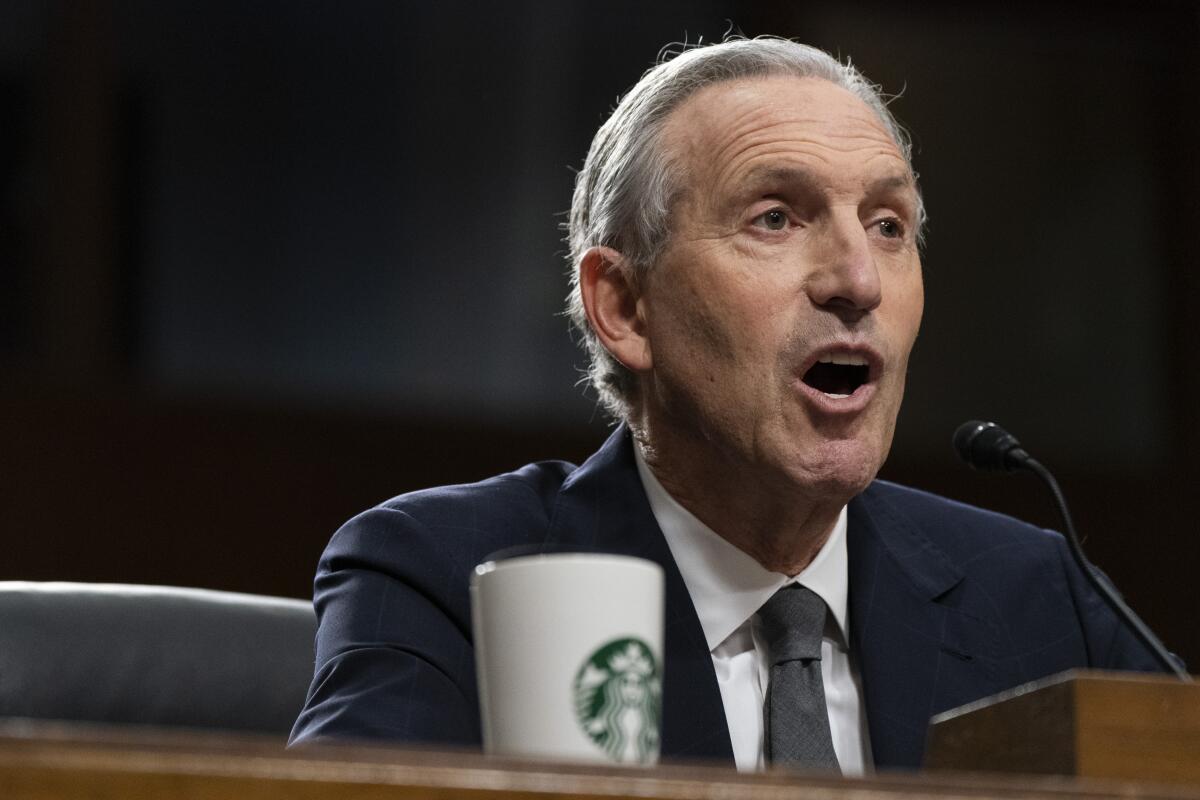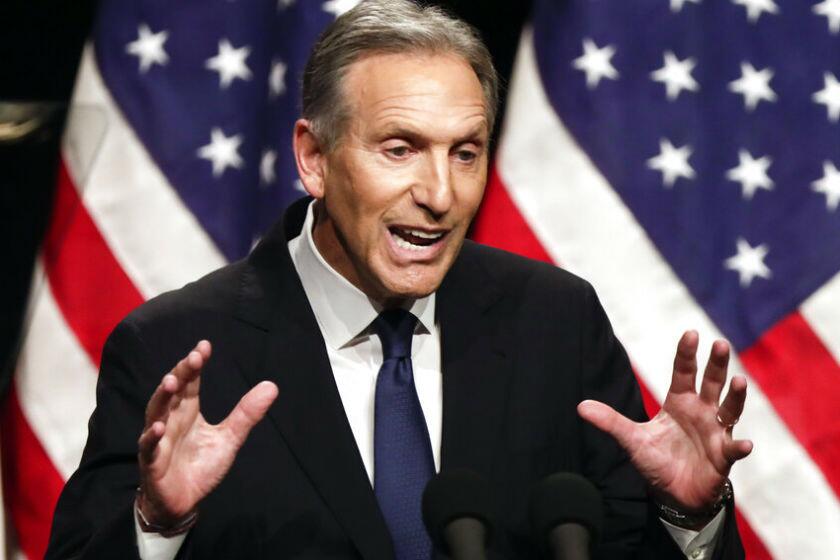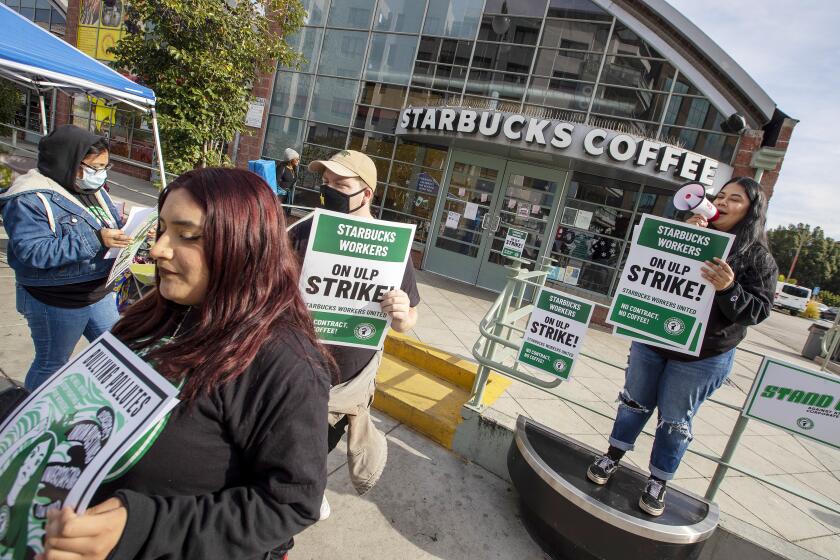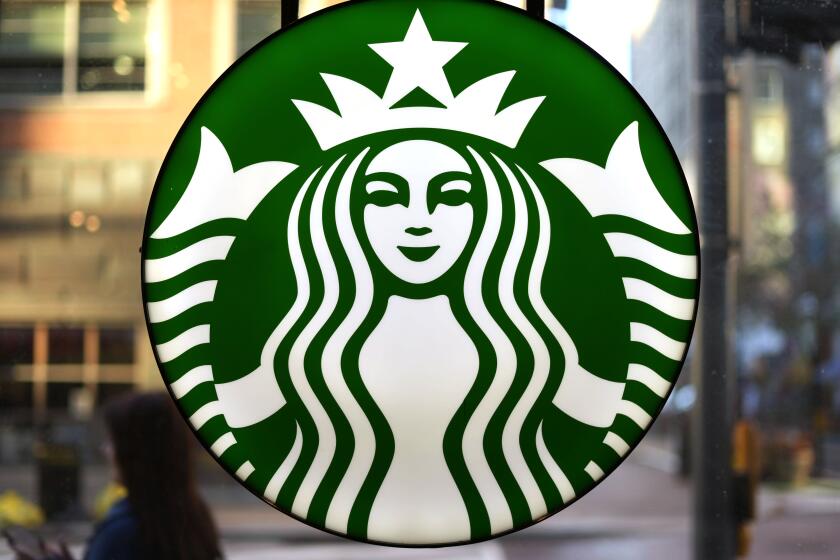Howard Schultz spars with Bernie Sanders over Starbucks union tactics

- Share via
Recently departed Starbucks Chief Executive Howard Schultz forcefully defended the company’s response to union organizing at a Wednesday Senate hearing, rejecting judges’ and prosecutors’ accusations that the coffee chain repeatedly violated labor laws.
“We have not broken the law, we have simply tried to defend ourselves,” Schultz told the Senate Health, Education, Labor and Pensions Committee.
Asked by Chairman Bernie Sanders (I-Vt.) about a labor board judge’s ruling that the company had committed “egregious” violations of the law, Schultz said: “We’re confident those allegations will be proven false.”
Schultz testified that his own involvement in union-related activities during his recent stint as interim CEO was “de minimis,” and that he had never been involved in discussions about terminating workers who were part of union drives.
Schultz bristled at Sanders’ repeated references to him as a billionaire, which he said were unfair. “I came from nothing,” he said. “Yes, I have billions of dollars — I earned it. No one gave it to me. And I have shared it” with workers.
Starbucks promotes itself as a friendly place to get a latte or caffeinated milkshake, but behind the smiles it’s been a leader in bare-knuckled union-busting.
When asked by Sanders whether he had ever “threatened, coerced or intimidated” a worker, Schultz was more equivocal.
“I’ve had conversations that could have been interpreted in a different way than I intended,” Schultz said.
The National Labor Relations Board’s general counsel issued a complaint last year alleging Schultz’s comments to a worker in a meeting constituted an illegal threat. The worker told Bloomberg News that Schultz asked: “If you hate Starbucks so much why don’t you go work somewhere else?”
“That’s not exactly what I said,” the former CEO told the committee, later adding the employee had a “disruptive mentality.” Schultz said what he told the worker was “if you hate the company, you could work somewhere else,” and that his comment “was not a threat.”
Testy back-and-forth
Throughout the sometimes-testy back-and-forth with lawmakers, Schultz, who drank from a Starbucks-branded cup, said the company respects the right to organize but prefers to deal with employees directly without a union.
Four Starbucks stores in the Los Angeles area will probably remain shuttered through the weekend as workers take to the picket line.
“I have the right, and the company has the right, to have a preference, and our preference is to maintain the direct relationship,” he said. Unlike other companies in the past where unions served a useful role, Schultz said, “we do nothing that is nefarious.”
Starbucks’ home-state senator, Patty Murray (D-Wash.), joined in the grilling, saying she has been “disappointed” hearing employees’ “really troubling reports” about anti-union conduct.
Schultz agreed to testify before the committee this month after Sanders scheduled a vote on a subpoena that would have forced the executive to appear. Schultz had been set to step down as CEO at the end of the month, but instead left his position two weeks early. He remains on the company’s board.
Sanders opened the hearing citing broad statistics on yawning income inequality and rising interest in organizing among U.S. workers.
“In order to combat this increase in union organizing, corporations have engaged in an unprecedented level of illegal union-busting activities,” he said. “Over the past 18 months, Starbucks has waged the most aggressive and illegal union-busting campaign in the modern history of our country. That union-busting campaign has been led by Howard Schultz.”
The walkouts are timed to coincide with Starbucks’ Red Cup Day, when the company gives free reusable cups to customers who order a holiday drink.
Republicans repeatedly rose to the company’s defense during the hearing. The committee’s top Republican, Sen. Bill Cassidy of Louisiana , described the proceeding as “a smear campaign” against Schultz and Starbucks “based upon allegations that everyone knows are still under litigation.” He urged the committee to also explore allegations of misconduct by the NLRB itself.
Such allegations raise a question, Cassidy said: “Are NLRB employees weaponizing the agency against American employers to benefit politically connected labor unions?”
The hearing has drawn unusual levels of attention. More than 100 people, including Starbucks employees there to support the union or the company leadership, lined the halls waiting to enter the hearing an hour before it was scheduled to start.
The Workers United Labor Union has prevailed in elections at about 300 of Starbucks’ roughly 9,000 corporate-owned U.S. cafes over the previous 16 months, spreading from an initial landmark victory in Buffalo, N.Y., to sites throughout the country. But none of the newly unionized cafes have come close to securing a collective bargaining agreement with the company, and the pace of new unionization petitions has slowed down, as workers allege that the company has been retaliating in stores and stonewalling at the bargaining table.
U.S. National Labor Relations Board prosecutors have issued more than 80 complaints against Starbucks, accusing the company of illegal anti-union tactics including threats, store shutdowns and terminations of dozens of activists. Administrative law judges have issued nine rulings against the company over the last year. U.S. federal judges have ordered the company to reinstate fired workers in Tennessee and Michigan, and NLRB members have ruled that the company illegally retaliated against workers in Philadelphia and refused to negotiate with union members in Seattle.
Starbucks baristas nationwide have scored unionization successes, and the company is fighting back
Starbucks has said repeatedly that all claims of anti-union behavior are “categorically false,” and is appealing many of the rulings. The company said recently that many of the labor board’s cases against it constitute efforts to establish new labor law precedents, in situations where the company is already complying with existing labor law. “Where partners have been subject to discipline, those partners engaged in misconduct contrary to Starbucks policies and procedures,” Schultz said in written testimony submitted to the committee.
Bloomberg writers Leslie Patton, Tatyana Monnay and Diego Areas Munhoz contributed to this report.
More to Read
Inside the business of entertainment
The Wide Shot brings you news, analysis and insights on everything from streaming wars to production — and what it all means for the future.
You may occasionally receive promotional content from the Los Angeles Times.













